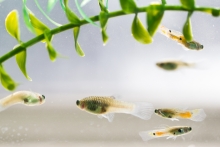Male guppies exposed to predators in the wild or in captivity have heavier brains than those living in relatively predator-free conditions, according to new research published in the journal Functional Ecology.
Behavioural ecologists at McGill University in Montreal sampled guppies from two rivers in northern Trinidad. In each river, guppies live both above a waterfall, a location that only guppies and a few other small species of fish have managed to colonize, and below the fall, where many predators including pike cichlids live.


